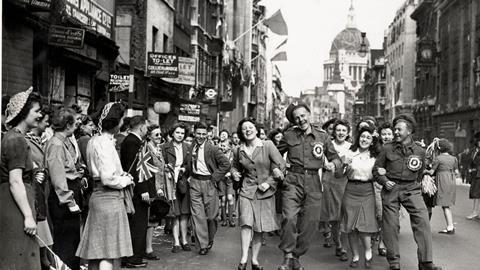The Law Society’s Gazette of May 1945 ran to just 16 pages - half its prewar size - on poorer grade paper than in 1939. But its austere pages carried some hints that the agony of the past five and a half years was nearing an end.
Professional notices include announcements such as: 'Geoffrey Morpeth MA, at present serving as a lieutenant-colonel in the Royal Artillery, will return to the practice of Watson, Burton, Booth & Robinson of Newcastle-upon-Tyne immediately following demobilisation.'
A particularly happy announcement was the list of solicitors and articled clerks back in the country following years in prisoner of war camps. Most were officers - one a lieutenant colonel - but Private AJS Hall and Ordinary Seaman MSD Hart were among those to receive 'letters of welcome' from the Law Society president.
The item adds: 'Several ex-PoWs have been kind enough to write or call at the Society's offices and express appreciation of the help given by the Council in supplying legal text-books, sets of the law reports and the Gazette, and holding special examinations,' the article continued. Such special examinations were held in Stalag 383 in Bavaria and Oflag IX at Spangenberg Castel in Northern Hesse. In February 1945, the edition records: one PoW candidate passed the accounts section of the intermediate examination, three passed the whole examination (a 100% pass rate).
Elsewhere, the legal practice section covers the status of wills that soldiers were required to write pro-forma in their pay books, a grim prelude to going into action.

The edition's 'Honours and Awards' section records some of the astonishing feats required of solicitors and articled clerks in uniform. It contains than 30 names, recipients of the Military Cross, Distinguished Flying Cross and mentioned in despatches, for 'gallant and distinguished services in the field'.
Most of the service was in 'North-West Europe'. However the longest citation concerns Ian Llewellyn Tibbs, articled to Mr EJ Horniblow of Reading and London frm Ellis & Fairburn, who was awarded the Miltary Cross in another theatre, Burma:
'On 5th August 1944, during the battalion attack, Lieut. Tibbs immediately led an asssault on the bunker, which was unsuccessful, owing to casuatlties. Then, though wounded by grenades, he refused medical attention and reorganised and led a second assault on the position. This attack was successful and, during the action, he personally bayonetted and killed at least four of the enemy.
'For the remainder of the day, though suffering leg and arm wounds, he was an inspiration to his platoon refusing to be evacuated for medical attention.
'Later in the day, Lieut. Tibbs crawled back under intense MG fire to a section post which had been wiped out, and recovered maps and documents left by a dead officer. 'It was largely due to Lieut. Tibbs' superb leadership and gallantry that his company was able to attain their objective, which led to the eventual success of the operation.'
It was a reminder that the war in the east was still raging - and expected to continue for another two years.
Fronting the edition of course is the Roll of Honour, which had filled so many of the Gazette's pages between 1914 and 1918. It was revived 20 years later to record the deaths of two solicitor pilots, including John Noel Isaac, the very first serviceman to fall in 1939, less than two hours into the war. The roll would trickle on for months, with cryptic notes 'now presumed dead' about solicitors and articled clerks who had simply disappeared on active service. May 1945's roll lists 11 names: one seaman, three RAF and the rest serving in the army.
In all, according to the Law Society's 1939-1945 Book of Remembrance - on display in the Reading Room - some 600 solicitors and articled clerks died in the 1939-1945 war.
As for VE Day itself, Gazette readers had to wait until June 1945 for the headline: 'The end of hostilities with Germany.'
The article continues: 'On the occasion of VE Day, the folllowing Loyal Address was submitted to His Majesty the King: 'We, your most loyal subjects, the President, Vice-President and Members of the Council of The Law Society, desire on behalf of the Solicitors' branch of the legal profession to offer the assurance of our affection for Your Majesty, Her Majesty The Queen, Her Royal Highness Princess Elizabeth and other members of the Royal Family, and of our loyalty and devotion to the Throne, and respectfully to tender our sincere congratulations on the successful conclusion of the war against Germany.'
Many years later, a distinguished solicitor recalled his personal VE Day. Robert King, one of those who had sat the intermediate exams in a PoW camp during two weary years of captivity, told the Gazette: 'On the evening of 11 April, we began to hear guns. They came nearer and shells passed over the camp all night. I doubt if anyone slept at all. At about 9am, there was a commotion at the gate. There were two American corporals in a jeep with a French foreign worker, looking highly embarrassed, surrounded by hysterical British officers.
'Many wept openly. It was over.'
Back numbers of the Gazette, as well as the Book of Remembrance, are available to consult at the Law Society's Library.





































No comments yet